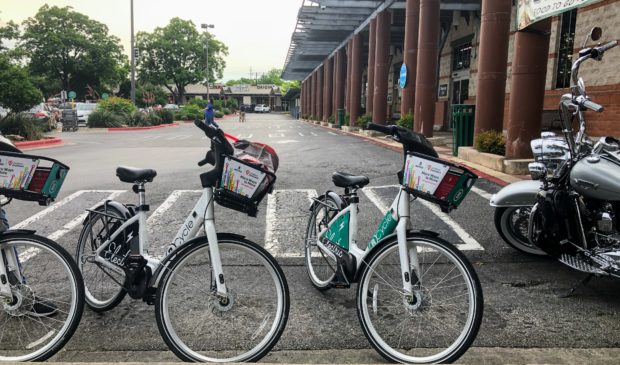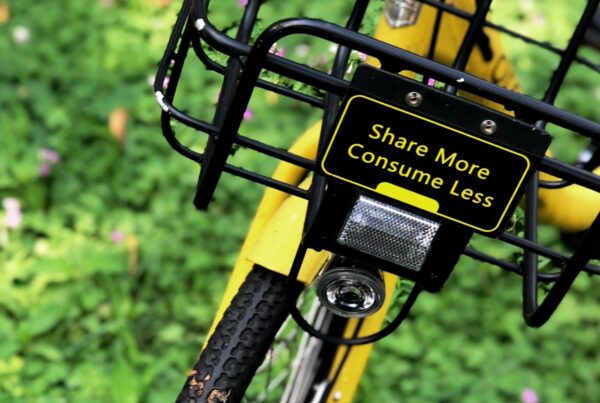Welcome to the Shared-Use Mobility Center’s weekly guide to the most impactful news, thought-provoking articles and innovative technologies that are shaping our transportation future. We believe in sharing information, just like sharing cars, bikes, and scooters, so if there’s anything additional you’d like to see, just drop us a line.
SUMC News and Announcements
Austin’s MetroBike gets the go-ahead. Board approves the bikeshare-to-transit MOD On-Ramp program project.

Photo by Ryan Thornton, Austin Monitor
On Monday, July 20, Capital Metro’s Board of Directors approved a resolution to execute an InterLocal Agreement (ILA) with the City of Austin to co-manage and integrate bikeshare to the public transit system. This partnership is the result of Shared-Use Mobility Center (SUMC)’s work providing technical assistance to Capital Metro during the Mobility on Demand (MOD) On-Ramp Program.
While sprawl, congestion, and changing travel patterns are not unique to this fast-growing region, the City of Austin and Capital Metro chose to address these issues through the MOD On-Ramp proposal. The plan entailed integrating bikeshare to transit—in doing so expanding the service area to improve first/last-mile access, introducing electric bikes, and leading towards a multimodal, rider-centric mobility integration.
After 12 months of free, in-depth, technical assistance from the MOD On-Ramp program to focus on innovation and implementation, the ‘MetroBike’ program is official. The City and Capital Metro are partnering with the local non-profit Bike Share of Austin for the program’s operations and maintenance. We are looking forward to the next milestone.
Learn more about the On-Ramp program here.
Join us for a new Webinar
Inclusive Mobility: Enabling the Participation of Older Adults and People with Disabilities
The National Aging & Disability Transportation Center and the Shared-Use Mobility Center invite you to a webinar about shared mobility and how these transportation options can work for aging populations and people with disabilities. Speaking will be Steve Yaffe of Yaffe Mobility Consulting, Mitch LaRosa, Program Director for Shared Mobility, Inc., and Al Benedict, Research Manager for the Shared-Use Mobility Center. Join us!
Register in advance for this webinar.
Mobility Justice
Sustainable growth and development in cities cannot be equitable if community placemaking and engagement is ignored. Curbed takes examples and stories from urbanist projects around the US, showing how city planners can overlook, and even harm, the communities of color they aim to serve.
Read the stories of five women cyclists who turned two wheels into tools of empowerment, connecting them to Black Lives Matter protests, reconnecting them to their cities, and acting as a vital, equitable form of transportation.
“…what counts as “neighborhood character,” and who gets to define it?” Rewire writes how a discussion about “character” in a St. Paul, Minnesota development project mimics arguments from past zoning laws in the US that excluded low-income people, people of color, and immigrants from housing due to overt classism and racism in predominantly white neighborhoods.
Director of Policy Development at APTA Darnell Grisby shares his history and thoughts about systemic racism in public transportation policy in the US, how it has been amplified through the lens of the Black Lives Matter movement, and three key solutions that can help rebuild transportation equity in metros.
Ridehailing/Carsharing/Carpooling
In a bold move, Uber has acquired transportation software company RouteMatch to “help bolster its own efforts to integrate more public transportation services in its app”, reports The Verge.
Meanwhile, a new initiative from the ridehailing giant involves working with US public health officials to get more accurate data around coronavirus contact tracing on people who use the Uber app.
Israeli ridehailing company Gett has raised a cool $100 million and is sticking to a focus of B2B on-demand rides in an every-changing transportation market.
Using their own cars, paying their own expenses, and working many odd hours creates a complicated map of how much ridehailing drivers make. As Seattle plans to set a minimum wage for drivers, Next City compares two studies that look at how much they really take home.
Bikesharing and Micromobility
Chicago’s Divvy bikeshare system is making a large expansion into the city’s Far South Side, adding 60 square miles to the network,and bringing 16.5 miles of bike lanes to offer more clean and equitable transportation options.
From this month through September, Bosch, Tern Bicycles, Stile Products, Inc., and B-Cycle are offering 12 cargo e-bikes and 24 regular e-bikes to community organizations, small businesses, and public entities in Chicago to help with the delivery of emergency food and supplies for South and Westside communities.
Portland’s BIKETOWN is expanding to the tune of 1,500 new pedal-assist e-bikes, effectively doubling the service area, to reach more residents in North and South Portland.
Starting in ten cities worldwide with more areas to come, Google Maps will give you trip-planning directions that directly integrate with docked bikeshare systems for easier multimodal wayfinding.
Transit
This worldwide pandemic has proven that public transit, even in its whittled state of ridership, is the backbone of how our cities function by giving essential workers affordable and reliable mobility. The bus is a cornerstone of these systems and deserves more public space for rapid transit, expanded stops and stations and other service-enhancing features.
London Mayor Sadiq Khan wants the entire Transport for London Tube network to meet zero-carbon energy sources by 2030 as part of new plans for the London Environment Strategy.
About $50 million is heading for Massachusetts east-west rail project after the State Senate approved the $17 billion Transportation Bond Bill for the state’s transportation system.
For Orlando’s Lynx bus system, the Link 8 route is the most popular one that helps connect low-income workers to other transit hubs and essential hospitality and tourism jobs. How will COVID-19 change ridership patterns for the route and what does mean for future transportation needs in the region?
Technology
Detroit-based initiatives like Michigan Mobility Challenge and PlanetM are turning the ‘Motor City’ into a mobility and robotics technology hub that is elevating the state of Michigan to an innovation powerhouse.
Watch Bloomberg’s feature on one company’s mission to electrify mass transit around the world—one bus at a time—to bring about an age of sustainable, clean energy for transportation, featuring Proterra Co-founder and Executive Director Ryan Popple.
DC’s Metro will be increasing the number of buses and trains, including adding more hours of service, to the system starting August 16 as the area’s transit demand inches closer to pre-COVID levels.
New York MTA’s new OMNY contactless fare payment system for transit reaches all subway stations in the Bronx, with more than 60% of all subway stations with it installed.
Sustainability
The ‘15-minute cities” concept championed by Paris Mayor Anne Hidalgo is front and center in C40 Cities’ latest report on green recovery strategies to help rebuild economies and mobility systems during COVID-19.
In the latest Talking Headways Podcast episode, host Jeff Wood sits down with assistant professor of Urban and Regional Planning at the University of Michigan Rob Goodspeed to talk about his new book on ‘scenario planning’ and how it is a useful tool for comparing the effectiveness of different approaches to land use, transportation planning, housing and more.
A July 14 webinar hosted by the Knight Foundation covered how transportation systems have adapted during the pandemic and what wins (and pitfalls) cities have experienced from the resulting initiatives. Read more on Smart Cities Dive.
A new report from management consultancy Arthur D. Little and International Association of Public Transport (UITP) creates context for sweeping, “system-level” changes to mobility governance and funding that would help bridge private operations with public goals for better MaaS integration.
Requests for Proposals, Inquiries, and Information
RFP: Twin Cities Electric Vehicle Mobility Network
The City of Saint Paul
St. Paul, MN
Deadline: August 07, 2020
RFI: Technologies to Assess Real Time Transit Vehicle Occupancy
Cal-ITP
California
Deadline: August 7, 2020
RFI: Creative Uses for Utilizing Existing Curbside Electric, Telecommunications, and Electric Vehicle Infrastructure
IndyGO
Indianapolis, IN
Deadline: August 14, 2020
Did someone forward this to you? Sign up for our newsletter here.



